Mastering Startup Sales: Strategies, Metrics, and Tools for Success
Anya Vitko
If you are a sales rep in a startup or are interested in becoming one, this article is for you. No startup can survive without an effective sales team. If the burn rate is positive and the cash runway is limited, this spells an impending disaster.
However, as an effective sales rep, you can thwart the danger by equipping your startup founder(s) with essential feedback from your first customers. Indeed, startup sales are as much about signing deals as product development, marketing, and customer success.
This article will give tips on how you can meaningfully contribute to a startup, whether you’re a sales development representative (SDR), an account executive (AE), or a sales manager. We’ll also share recommendations on budget-friendly tools to include in your sales tech stack.
Here’s what we’ll cover:
- What Is Startup Sales?
- The Role of Sales in Startup Growth
- How Startup Sales Differs from Enterprise Sales
- When Should Startups Hire a Sales Team?
- 10 Tips for a Strong Startup Sales Strategy
- Startup Sales Metrics
- How to Power Your Startup Sales Process with Yesware
What Is Startup Sales?
One of the unique features of startup sales is that in the very early stages, they’re carried out by founders who pitch their product or solution to investors. This means that the CEO formulates the business’s unique value proposition, sales strategy, and target audience.

Only after the founders have sustainable and recurring income can they afford to hire sales reps. While this means that some of the misunderstandings with potential customers are solved through trial and error at this stage, you still have a lot of work to do in terms of customizing the sales processes, tailoring the sales pitch to the unique needs of every prospect, and developing sales collateral.
At the stage when the startup has enough income to afford a sales manager, your task is to keep tabs on the key sales metrics, assemble the sales tech stack, and coach your sales reps.
The Role of Sales in Startup Growth
No startup can grow if it has no customers. As a rule of thumb, products don’t sell themselves. As a member of a B2B sales team, you do the hard work of identifying those who will benefit from the newly launched products and services and convincing them to become paying customers.
Thanks to direct contact with potential customers, you can gather essential insights about product-market fit. Let’s say, you work for a startup that sells a martech platform. The founder identified the ICP as a small business. During your demos, you notice that the potential customers refuse to proceed with deals because they think the martech platform is better suited for larger companies. This observation can lead you to two choices:
- Reevaluate and reformulate the sales pitch and demo
- Change the ICP and target medium-sized companies
Startup sales aren’t only about customer acquisition. It’s also about establishing long-term relationships with customers to understand what they value about the product. This is essential for minimizing customer churn and helping allocate funds to developing features that customers crave.

For example, collecting customer testimonials has been essential in Yesware’s sales strategy. Understanding that the clients value the ability to do A/B testing of their email campaigns with the help of Yesware’s reporting and analytics features has been instrumental in developing sales collateral, such as “how to” videos and articles.
How Startup Sales Differs from Enterprise Sales
Sales Cycle Length
Usually, the startup sales cycle is shorter than that of an established enterprise. According to research, the sales cycle in well-established SaaS companies can take up to 90 days. Startup sales in SaaS last between 65-75 days.
Due to the economic downturn, SaaS startups may have an advantage over bigger companies because B2B customers these days can’t afford large upfront payments and don’t desire annual contracts. Startups focused on improving their MVPs based on client feedback are more open to offering flexible contracts and adjusting their product development as needed.
Resource Allocation
In a larger enterprise, you might expect a rigid list of duties. For example, you can be a sales rep focused on prospecting and nurturing small business clients, while your colleague may be focused on conducting demos with sales qualified leads (SQLs). A member of the marketing team will be responsible for supplying you with sales collateral, such as case studies and testimonials.
In a startup, you may find yourself not only wreaking your head over how to reignite your cold outreach strategy but also making sales presentations and developing sales collateral all on your own. So, you should be prepared to wear multiple hats at the same time.
Flexibility and Adaptability
Working at a startup means being ready to change your sales pitch in the blink of an eye if needed. You should also be ready to stay open-minded and learn the new features that the founders decide to implement based on customer feedback.
Also, the work of sales reps in startups demands a high degree of independence. After hiring you, the founder might not have enough time to address all of your questions, so you might need to find answers yourself. This could include engaging in technical research to improve your expert sales technique to make the value of the product or service more clear-cut for prospects.
When Should Startups Hire a Sales Team?
How to Identify the Right Time
There’s no universal rule about when startups should hire sales professionals. According to Dock, the best time is when the startup’s ACV is at least $3,000. Another piece of advice is for founders to hold off on hiring until they have closed at least ten deals.
If you are among the first sales professionals on the team, your tasks will include:
- Understanding the founder’s product vision and learning what helped them close deals so far.
- Conducting outreach, running demos, signing contracts, and, perhaps, offering customer support post-sale.
- Promoting the startup’s brand and core values.
- Tailoring your elevator pitch to every potential customer.
- Building out sales collateral.
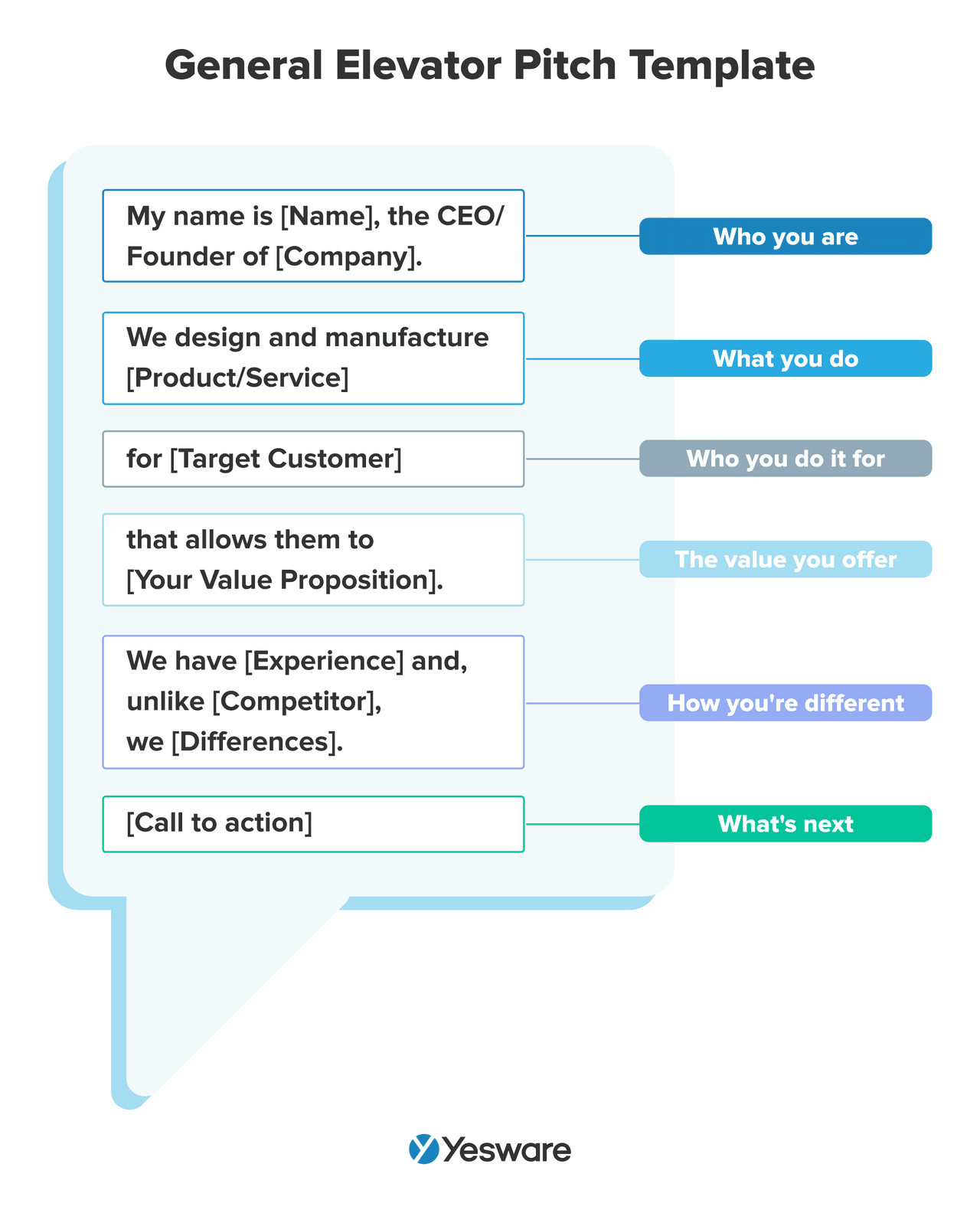
How to Build the Initial Sales Team
If you join the startup later in the development, your tasks may include:
- Helping the founder refine their sales motion, whether it’s outside sales, land and expand, product-led, or channel.
- Developing sales methodology.
- Analyzing metrics and refining the sales strategy to grow revenue.
- Hiring sales reps.
- Training sales reps in mock calls and empowering them with sales tips.
- Implementing sales technologies and building comprehensive sales tech to make the startup sales as efficient as possible.
Essential sales manager skills in a startup usually include developing a positive sales mindset and building a team of sales reps who embrace a growth mindset and are happy to handle multiple responsibilities at the same time.

10 Tips for a Strong Startup Sales Strategy
1. Define Your Ideal Customer Profile (ICP)
Because startups have limited financial resources, it’s important that you and your team focus only on those leads who are most likely to convert. Identifying the startup’s ICP is the first step. Consider what types of companies will benefit the most from your product or service.
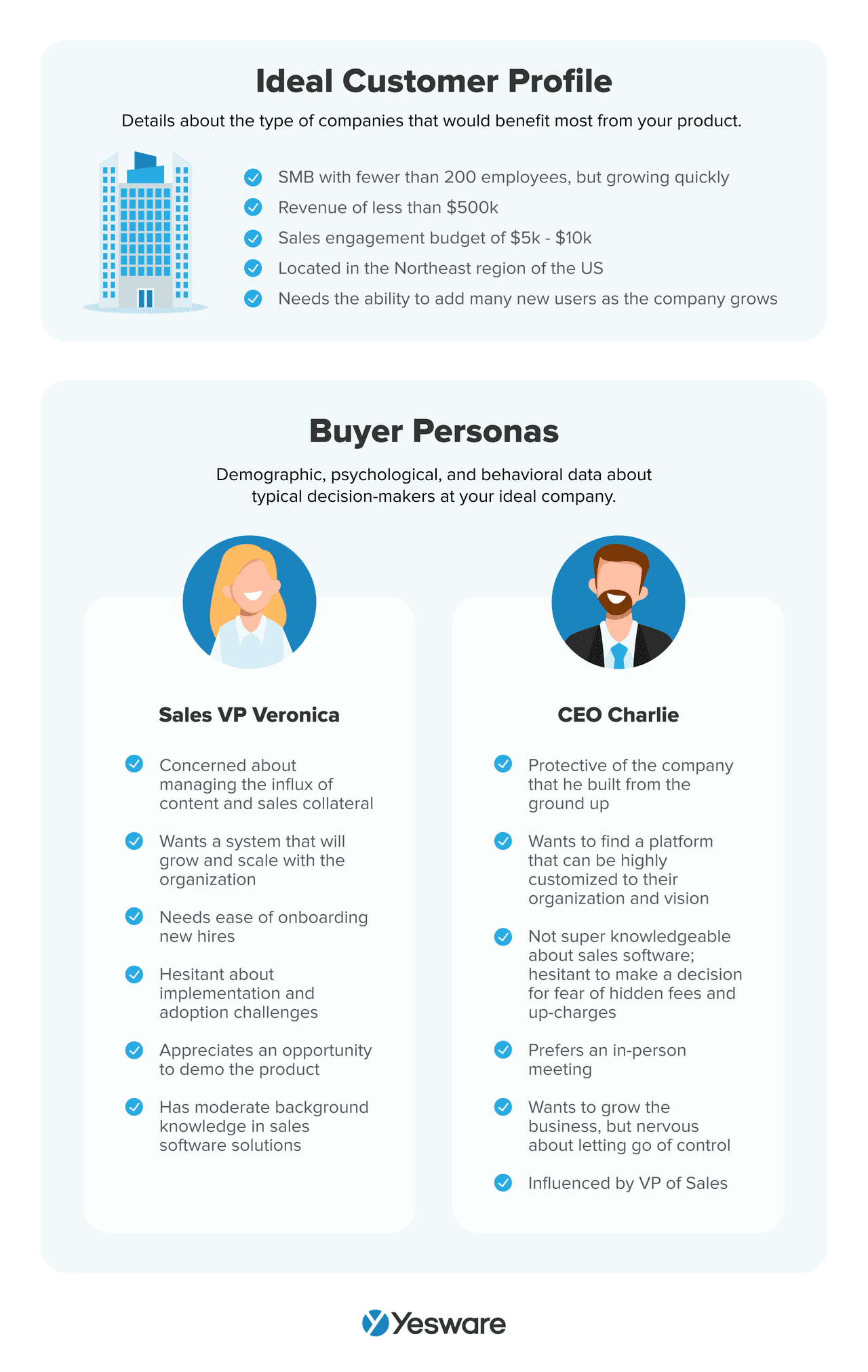
For example, Yesware is best positioned to help SMBs with sales teams no larger than 50 people to automate their outreach and lead nurturing.
2. Develop a Clear Value Proposition
While every sales pitch and sales demo need to be tailored to every prospect’s pain points, every startup should have a clear understanding of what makes their product or service stand out from the crowd.

For example, FullContact’s value proposition is that their product helps both small and big companies get access to personal and professional identities while staying compliant with data privacy regulations.
Armed with this clear value proposition, FullContact’s sales reps can tailor their sales pitch to different audience segments. For example, they might lean on the company’s ability to develop a personal profile when pitching to B2C brands and emphasize professional profiles when targeting B2B brands.
3. Build a Scalable Sales Process
As a sales manager, you are responsible for laying the foundation for a repeatable and efficient sales workflow. You should choose one or two of the sales motions and train your sales reps on sales methodologies for each.
- Outside sales: This sales motion works best when selling high-value or complex solutions. It leverages Sandler’s sales methodology where sales reps employ consultative selling techniques to explain the value of their startup’s solution.

- Land and Expand: This sales motion is effective when selling scalable solutions like SaaS platforms. It goes hand-in-hand with Challenger sales methodology because sales reps might want to challenge prospects to reconsider their legacy processes and dare adopt more efficient solutions.
- Product-Led Growth (PLG): This self-service model relies on the product itself to drive customer acquisition, retention, and expansion. It often leverages free trials or freemium versions to attract users who later convert to paying customers.
- Channel Sales: This sales motion relies on selling through trusted partners who already have established relationships with your target audience. Sales reps should leverage SPICED sales methodology to help potential partners see how a certain product or solution can solve their pain points.
4. Leverage Technology and Automation
Startups can’t afford inefficient processes, which is why you should always be on the lookout for tools and technologies to streamline as many manual tasks as possible. The number one technology on your list should be a CRM that can automate the processes of collecting leads’ contact information, qualifying them, and nurturing them throughout their buyer’s journey.
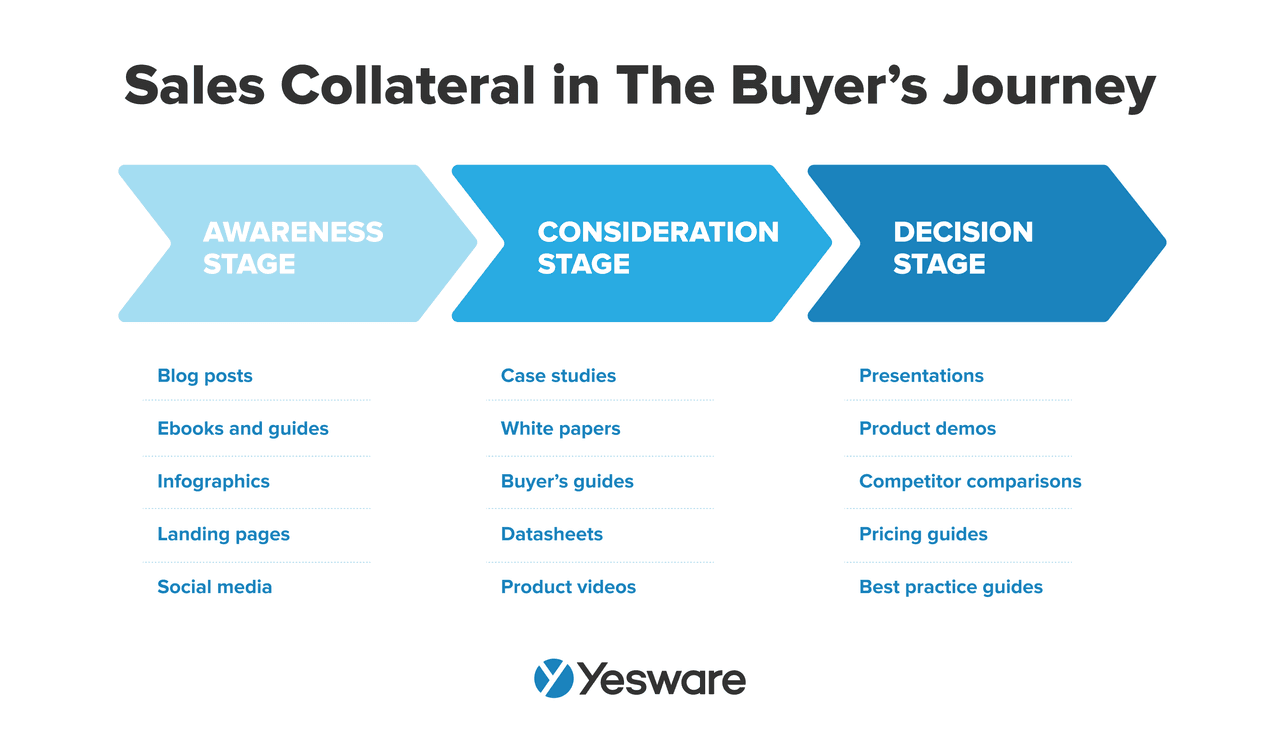
Here are some cost-effective CRM options for startups:
- Close is an easy-to-use, secure, and scalable platform with calling, SMS, Zoom, email, and calendar integrations.
- Vendasta’s CRM is a perfect fit for startup marketing agencies because it is an AI-powered technology that automates lead capture, lead qualification, and lead nurturing and seamlessly integrates with Vendasta’s white-label marketing platform that agencies can use to manage their clients.
5. Focus on Relationship Building
As mentioned above, startups have very limited budgets, so they should leverage one of the most cost-effective client acquisition strategies—word-of-mouth referrals. How do you achieve that? In fact, startups are at a disadvantage in this respect because contrary to established companies, they don’t have dozens of customer testimonials up in their sleeves.
By building rapport with prospects, engaging in sales relationship building, and ensuring superior customer service, you can make a big difference at your startup. Satisfied customers will vouch for your startup’s credibility and recommend your products and services to their friends and family, helping your quota attainment and filling your sales pipeline all the while easing your workload.

6. Implement Continuous Training and Development
There’s no end to learning and improvement in startup sales. To begin with, when conducting sales call outreach, you should become an expert in pre-call planning. You need to learn to leverage sales prospecting tools to devise comprehensive buyer personas and ICPs and tailor your sales pitches to every prospect.
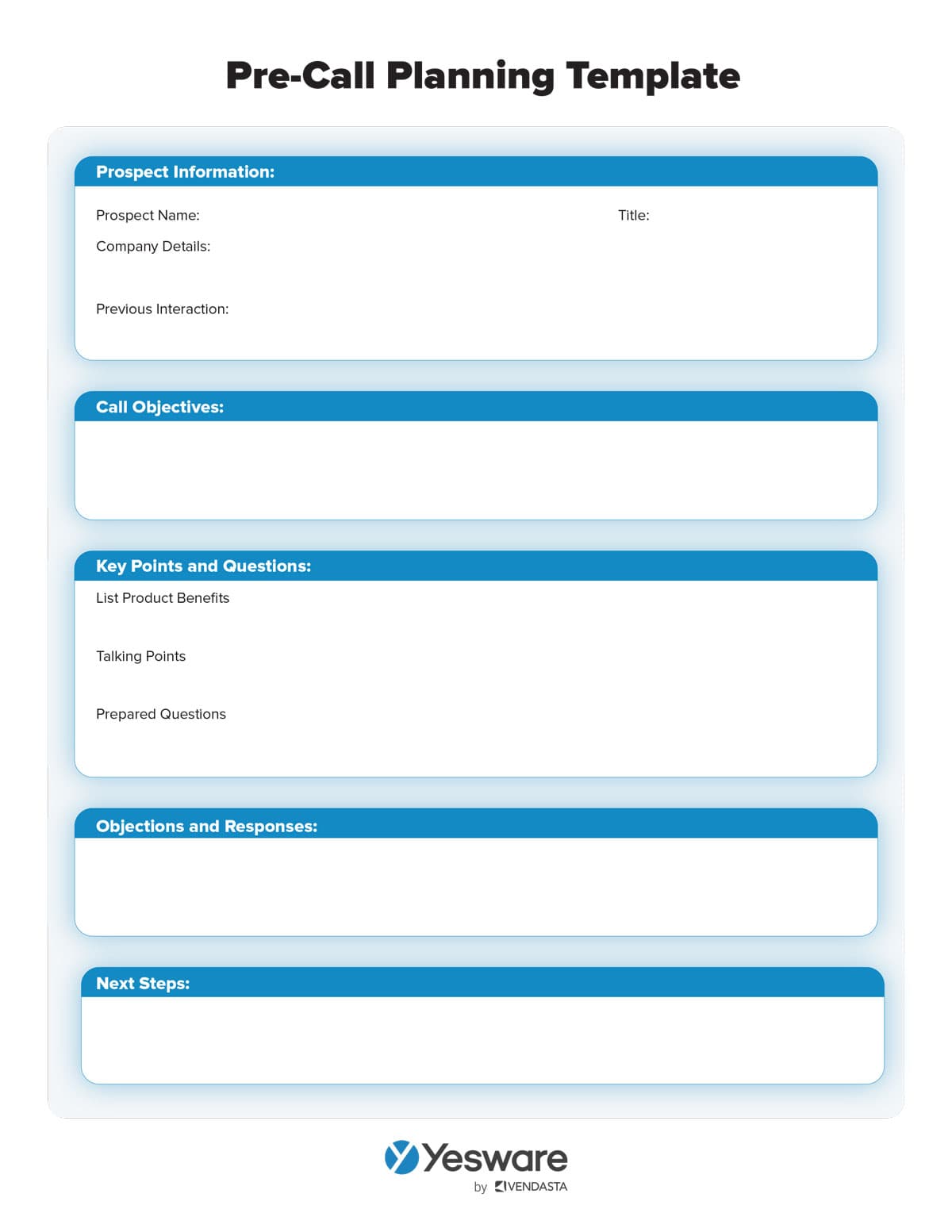
You should hone your active listening skills because one of the most critical mistakes a startup can make is to continue pouring resources into a product that nobody needs. As a sales rep, if you truly understand customer pain points and needs, you can help your startup founder avoid being caught in an information bubble or trapped in confirmation bias.
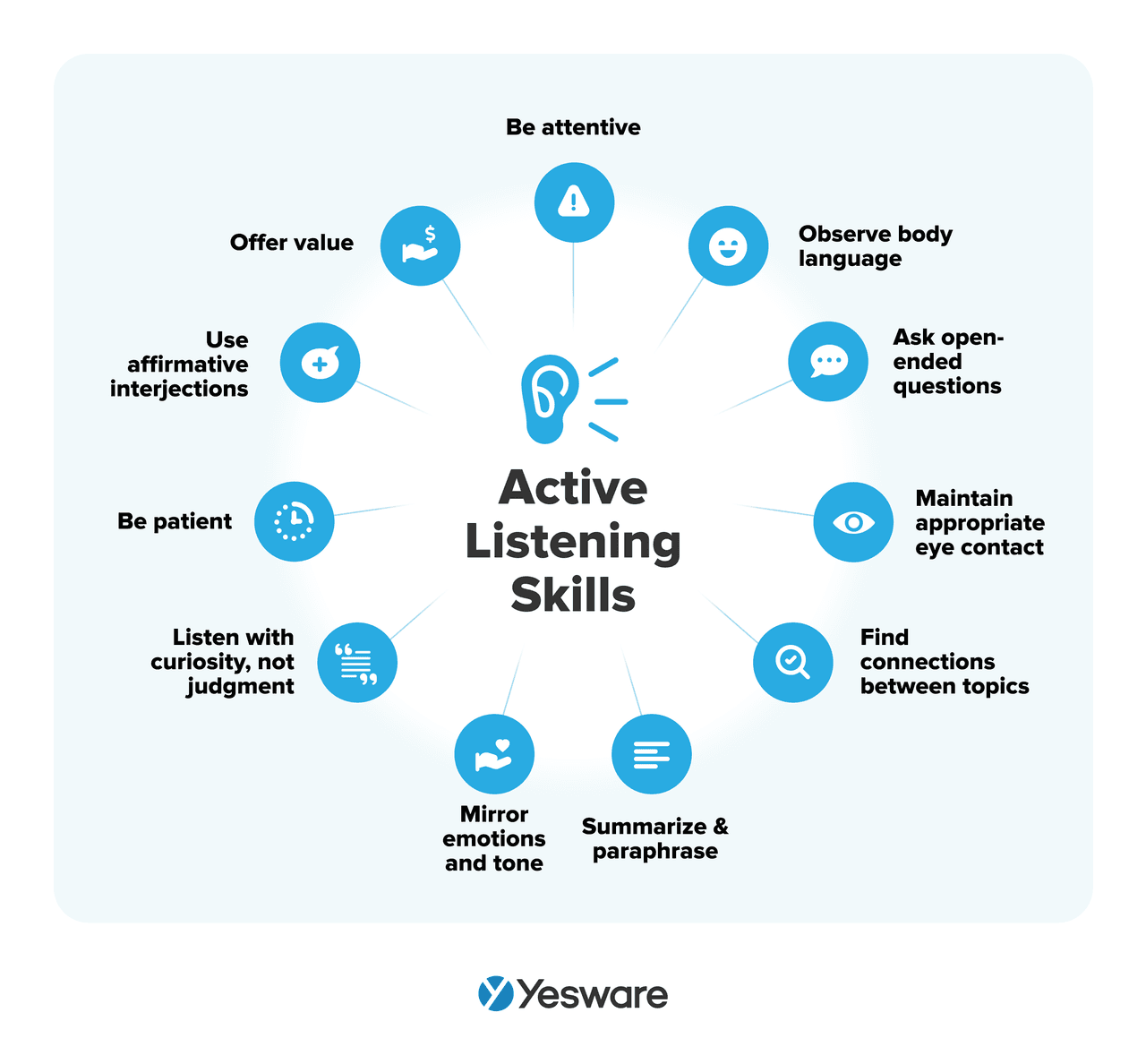
Further, as the startup’s products and services continue to develop further, you should learn to handle sales objections that are sure to arise especially if your startup competes against well-established players in the field. Get ready to prepare your sales battle cards!

You will also need to understand buyer behavior and design your sales strategies to play on various psychological and emotional triggers, such as FOMO and the importance of social proof.
7. Utilize Data-Driven Decision Making
We will take a closer look at key sales metrics to keep track of in your sales reporting later. For now, it’s worth noting that you should rely on analytics to assess how effectively your sales leads move through each of the following stages of your sales pipeline:
- Prospecting
- Lead qualification
- Demo or meeting
- Proposal
- Negotiation and commitment
- Opportunity won
- Post-purchase
Keeping an eye on the metrics can help you identify and address any bottlenecks and uncover opportunities for further training.
Data analysis is also integral to evaluating the overall effectiveness of your startup sales strategy. If the startup’s runway is getting short, it’s time to shake things up: adapt a new sales motion or opt for a different sales methodology.
8. Foster Cross-Functional Collaboration
As was mentioned before, sales reps in startups often don’t have the luxury or the bane (depending on your worldview) of rigid job descriptions. Yet, if your startup company has enough budget to hire marketing specialists, collaboration with them is integral to success. The misalignment between marketing and sales departments is a common challenge that may result in confusing messaging and, ultimately, impede a startup’s growth.
Also, in the startup environment, you should have no qualms about approaching product developers and informing them about any additional features that the customers want. For example, if you consistently lose deals because the product or service lacks features the customers need, informing the product development team can help them prioritize work to help the startup survive.
You should also ensure the handoff to the customer service team is as frictionless as possible. Make sure to document all client’s challenges and aspirations so that your clients don’t need to go through the headache of getting their customer service representative on board with their needs and goals.
9. Prioritize Customer Feedback
The mantra “customer is always right” is the North Star in startup sales. If prospects complain that the demos are too convoluted, for example, take it seriously and rework your sales collateral to fit their needs.
If your prospects complain about a lack of social proof, invest your efforts in sales relationship building so that you can rapidly grow your base of customer testimonials and reviews. Alternatively, look for tools that can help you automate the process of feedback collection.
10. Maintain Agility and Adaptability
As AI and automation are changing every industry, staying on top of the latest tools and technologies is paramount for startups. In the upcoming section, we will take a closer look at automation tools that can enhance your sales processes without demanding huge chunks of budget.
Startup Sales Metrics
Customer Acquisition Cost (CAC)
This metric is essential for assessing the overall effectiveness of your sales strategy. CAC is the total cost of acquiring a new customer, including marketing, sales, and other related expenses.
You can calculate it using this formula: CAC = Total Sales and Marketing Expenses ÷ Number of New Customers Acquired.
The lower the CAC is, the more cost-effective your acquisition efforts are.
Here are some average cost acquisition costs for B2B startups in various industries, according to First Page Sage:
- Automotive is $692
- Biotech is $694
- Construction is $349
- Cybersecurity is $429
- eCommerce is $84
- Entertainment is $329
- HVAC Services is $380
- SaaS is $273
If you notice that your CAC is too high, you could consider developing high-quality content to take advantage of inbound selling. Writing informative blogs and providing free webinars can pull customers to your startup without you needing to spend too much time on outreach.

Customer Lifetime Value (LTV)
This metric helps you understand whether you are going after the right customers. Customer Lifetime Value (LTV) is the total revenue you expect to earn from a customer over the entire sales relationship. Here is the formula to calculate it: LTV = Average Revenue per Customer × Customer Lifespan.
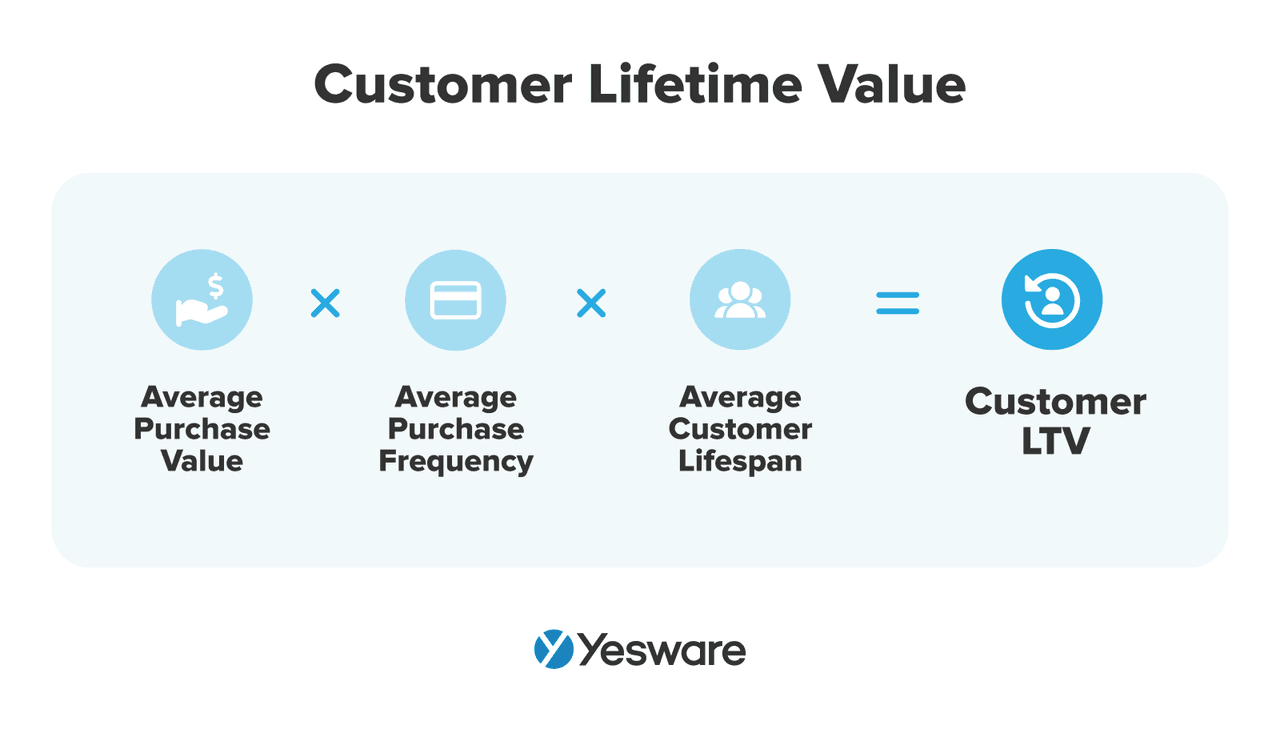
If you notice that the LTV is low, it might mean that the customer churn is high. This is a cause for alarm and further investigations. Does your startup’s products or services fail to live up to your customers’ expectations?
Figuring out the CAC to LTV ratio can also help you understand whether your CAC is justified. If the ratio is high, it could be a good idea to reconsider your sales tactics and make them more cost-effective.
Conversion Rate
This metric is invaluable for assessing how effectively your prospects move through the sales pipeline. As mentioned above, it helps you identify process inefficiencies. Calculate it using this formula: Conversion Rate = (Number of Conversions ÷ Total Leads) × 100.
If the percentage of conversions is low when it comes to sending proposals to leads who get sales demos or meetings with you, you might want to reevaluate your demo.
Sales Cycle Length
When you consider the average amount of time it takes to close a deal, you might determine the need to optimize your sales processes if the sales cycle is unacceptably long. Shorter sales cycles mean quicker revenue generation and better use of your energy and resources, which is especially critical for startups.

Your CRM is your go-to technology for getting information about your average sales cycle. To assess it, simply add up the total number of days it took to close every sale and then divide this sum by the total number of deals.
Monthly Recurring Revenue (MRR)
In subscription sales, MRR provides a clear picture of your startup’s financial health and growth trajectory, allowing you to forecast and plan effectively. Use this formula: MRR = (Number of Customers) x (Average Monthly Revenue per Customer).
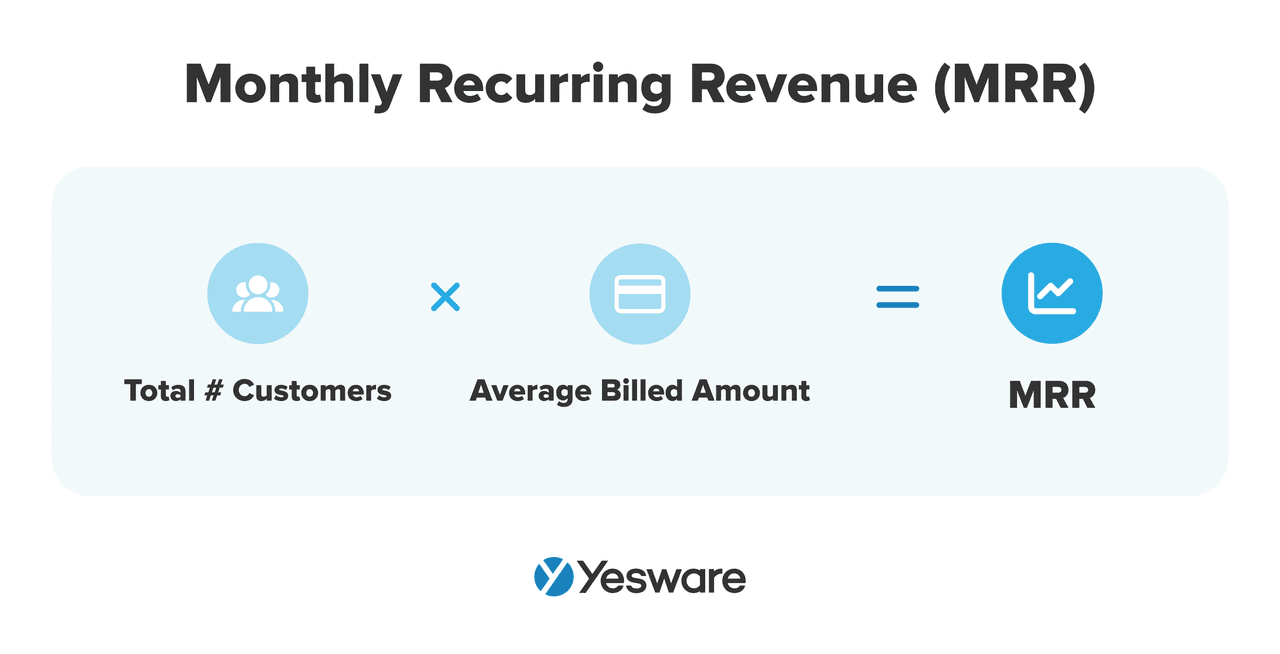
How to Power Your Startup Sales Process with Yesware
If you are looking for a cost-effective solution, Yesware can take your startup sales to the next level.
Yesware’s Prospector gives you access to a dataset of more than 100 million business profiles, making it easy for you to discover companies that are likely to benefit from your startup’s products or services.

Yesware’s email templates with dynamic fields save you hours on drafting emails for email outreach and follow-up campaigns. Yesware’s integration with popular CRMs like Salesforce makes email customization at scale easy because you can simply add your Salesforce list to Yesware will populate dynamic fields automatically with your prospect’s names.
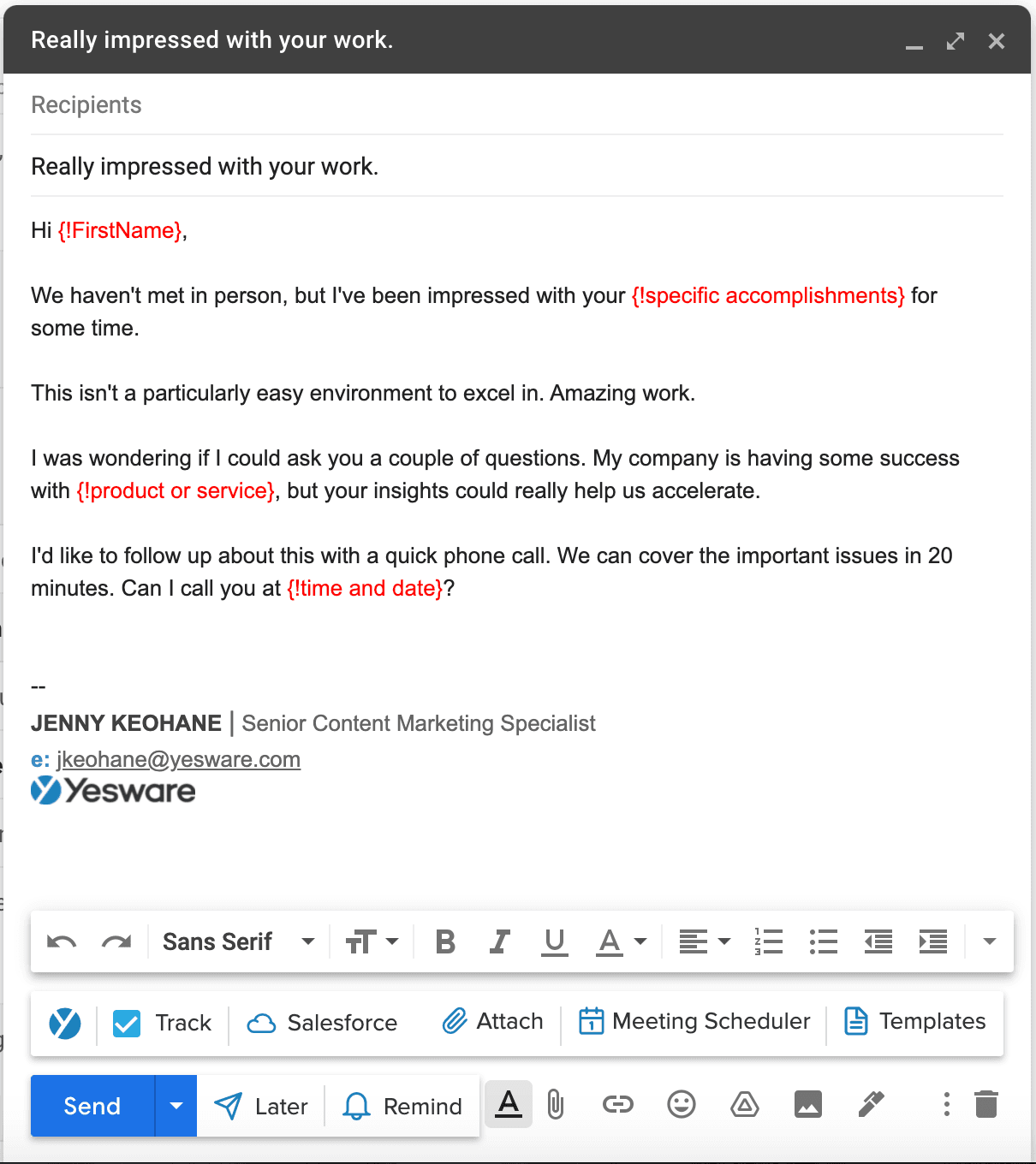
Learn more: How to Automate Emails in Outlook and how to leverage Gmail Automation.
When you send your email campaigns, you can set your startup apart by effectively customizing every demo by leveraging Yesware’s reporting and analytics capabilities. Here is one example of how.
Let’s say you send out nurturing emails with demos of your startup’s martech software. Yesware’s attachment tracking feature allows you to see what slides your prospects engage with the longest. This information is invaluable for helping you prepare for the sales demo by leaning in on the features that your prospects value the most.

Sales team collaboration is essential for success in startup sales. Yesware empowers you to share your templates, insights, and best practices with your sales team.

Here is an ebook with some great ideas to get you started with email templates:
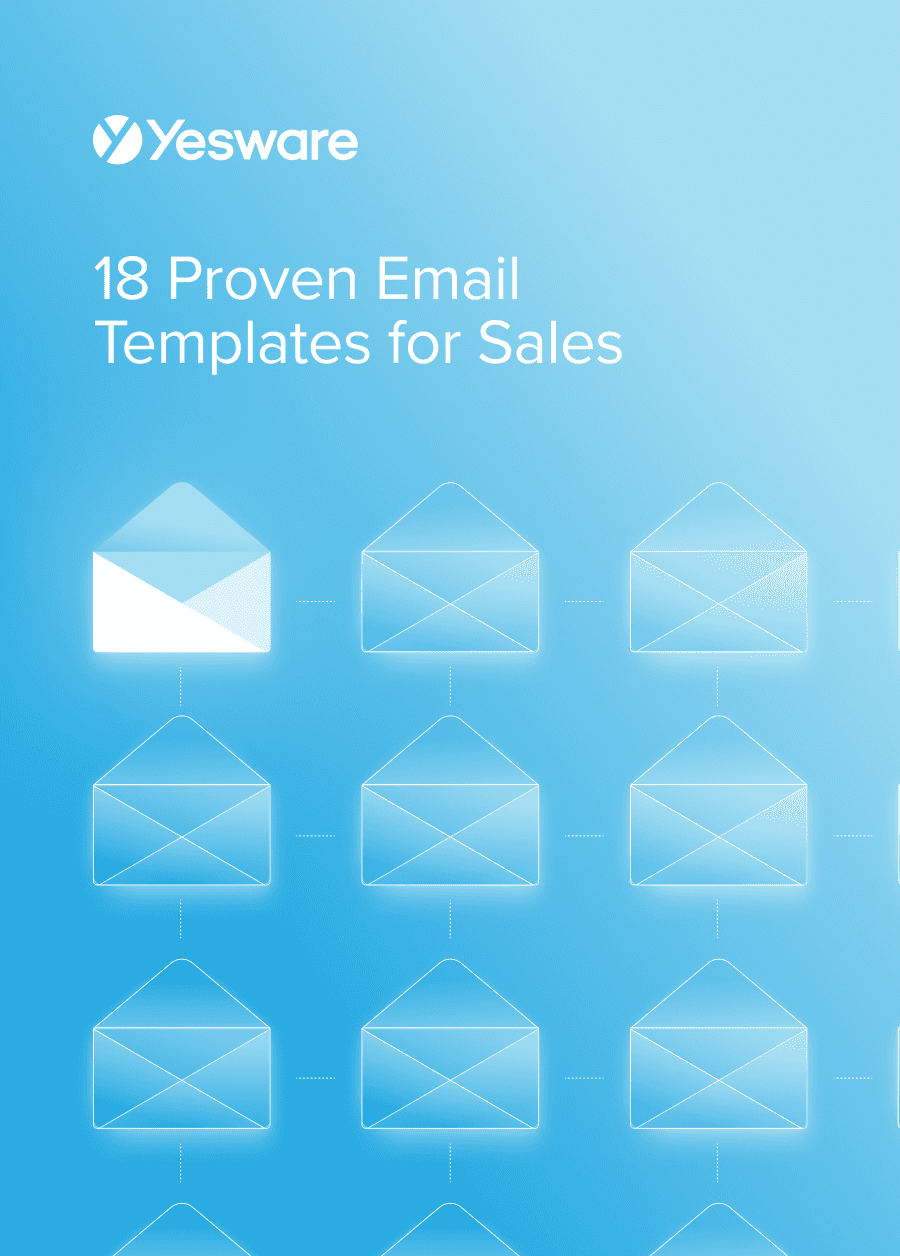 18 Proven Email Templates for SalesWinning email templates for cold outreach, follow-ups, and nurturing relationships – backed by data and real-world examples.
18 Proven Email Templates for SalesWinning email templates for cold outreach, follow-ups, and nurturing relationships – backed by data and real-world examples.
Power Your Startup Sales Process
Hopefully, by now, you are fully prepared to win the startup sales game. You have a clear idea of what to expect in a startup environment. You have a list of sales skills to nurture. And you are well aware of the key sales metrics to analyze to make your sales strategy as effective as possible.
Make your busy professional life easier by adopting Yesware. The best thing about this sales engagement platform is that you can try it out for free. Sign up or contact sales today!
Get sales tips and strategies delivered straight to your inbox.
Yesware will help you generate more sales right from your inbox. Try our Outlook add-on or Gmail Chrome extension for free, forever!
Related Articles
Casey O'Connor
Casey O'Connor
Casey O'Connor
Sales, deal management, and communication tips for your inbox

